This article needs additional citations for verification .(March 2011) |
Claudio Cavazza (4 May 1934, Bologna - 6 June 2011, Rome, Lazio) [1] was an Italian entrepreneur, Chairman and founder of the Sigma-Tau pharmaceutical company. [2]
This article needs additional citations for verification .(March 2011) |
Claudio Cavazza (4 May 1934, Bologna - 6 June 2011, Rome, Lazio) [1] was an Italian entrepreneur, Chairman and founder of the Sigma-Tau pharmaceutical company. [2]
Instigator and promoter of the scientific section of the Festival dei Due Mondi (Festival of the Two Worlds) in Spoleto, SpoletoScienza, organized by the Fondazione Sigma-Tau, which quickly established itself as one of the most important events dedicated to matters of science and epistemology of our times. After having graduated with a degree in pharmaceutical chemistry and studied for some time under Professor Noris Siliprandi, Professor of Biochemistry at the University of Padua, Cavazza soon made the decision to dedicate himself to entrepreneurial activities. His entrepreneurial breakthrough into the pharmaceutical sector happened in the mid 1960s, thanks to the launch of Rekord B12, which soon became one of the highest selling medicines in Italy and elsewhere. Its success originated from the discovery that vitamin B12 develops an antiasthenic and antidepressant effect at high doses. The medicine was also distinctively packaged in a particularly innovatively designed tube, which was exhibited at the Museum of Modern Art in New York City. An equally fundamental step in the history of Sigma-Tau group was the decision – resulting from the passion and determination of Claudio Cavazza – to dedicate significant resources to scientific research into the study of carnitine, an endogenous substance of natural origin that is without side effects, which intervenes in the processes that allow cells to produce their own energy sources. The study of carnitine produced preparations of proven efficiency, able to correct metabolic defects, whether congenital or acquired, in different clinical situations. Over the years, Sigma-Tau group has broadened its presence in the international scene with branches not only in the major European countries of France, Switzerland, the Netherlands, Belgium, Portugal, Germany, and the United Kingdom, but also in India, and with two production plants in the United States and Spain. Sigma-Tau group has around 2,500 employees, 400 of whom are researchers involved in the most advanced sectors of national and worldwide research in which it reinvests 16% of its turnover.
Claudio Cavazza was Chairman of Italian pharmaceutical industry association, Farmindustria, from 1986 to 1992. He was a member of the presiding committee of the Italian employers’ federation, Confindustria, subsequently invited to join Confindustria’s technical education committee and the steering committee formed by the Confindustria Health Commission. In January 2008, Cavazza was made manager of the industrial innovation project “Nuove Tecnologie della Vita” (New life science technologies) within the Italian Ministry of Economic Development. He was a member of the board of EFPIA (European Federation of Pharmaceutical Industries and Associations), of which he was vice president from 1992 to 1994. He was also member of the Council of IFPMA (International Federation of Pharmaceutical Manufacturers Association).
Cavazza was appointed to the order of Knight of Labour in 1987. In 2005, the University of Genoa awarded him an honorary degree in Medicine. He was awarded an honorary degree in International Business Strategies from LUSTICO, the Free International University for International Studies of Ostia. In recognition of his commitment to research and development activities for rare diseases in the United States, in 1995 the county of Maryland established the Claudio Cavazza Science Award. In June 2005 he was awarded the Pharma-Finance award for biotechnologies, and in December 2009 was given the title of meritorious member of the non-profit Italian association for fragile X syndrome (Associazione Italiana Sindrome X Fragile Onlus) for the commitment he has shown towards those affected by the syndrome.
In 1986 Claudio Cavazza instigated the creation of the Fondazione Sigma-Tau, intended to introduce the concepts of entirety and complexity of the humanities into entrepreneurial planning and medicine, in order to promote academic and cultural debate and encourage scientific progress. Cavazza founded the Sigma-Tau publishing house in 1988, producing the scientific magazine Sfera, an editorial project of 43 parts published between 1988 and 1995. Through its innovation it gained two awards, the Galileo in Italy in 1989, and the Prix Caméra in Paris in 1991.
Cavazza took part in numerous CNR (Consiglio Nazionale delle Ricerche – Italian National Research Council) consulting committees:
For the Italian Ministry of Research he has also participated in:
He was vice president of the committee of Aspen Institute Italia, an institute that promotes collaboration and research at international level on the policies of development in large global areas.

Rita Levi-Montalcini was an Italian Nobel laureate, honored for her work in neurobiology. She was awarded the 1986 Nobel Prize in Physiology or Medicine jointly with colleague Stanley Cohen for the discovery of nerve growth factor (NGF).

Laura Maria Caterina Bassi Veratti was an Italian physicist and academic. Recognized and depicted as "Minerva", she was the first woman to have a doctorate in science, and the second woman in the world to earn the Doctor of Philosophy degree. Working at the University of Bologna, she was also the first salaried female teacher in a university. At one time the highest paid employee of the university, by the end of her life Bassi held two other professorships. She was also the first female member of any scientific establishment, when she was elected to the Academy of Sciences of the Institute of Bologna in 1732 at 21.
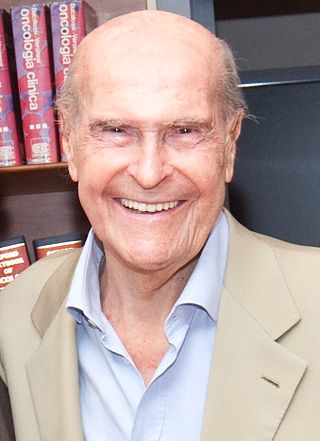
Umberto Veronesi was an Italian oncologist, physician, scientist and politician, internationally known for his contributions on prevention and treatment of breast cancer throughout a career spanning over fifty years.
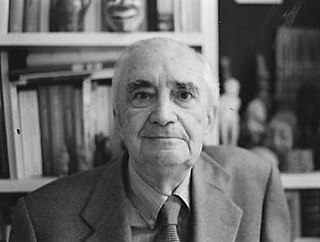
Virgilio Tosi is an Italian documentary filmmaker and historian of early film.
Caterina Davinio is an Italian poet, novelist and new media artist. She is the author of works of digital art, net.art, video art and was the creator of Italian Net-poetry in 1998.
Leadiant Biosciences, formerly known as Sigma-Tau Industrie Farmaceutiche Riunite, was founded in 1957 by research chemist Claudio Cavazza.

Massimiano Bucchi is an Italian sociologist, writer and a scholar of the relationships among science, technology and society.
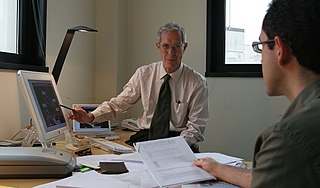
Arturo Falaschi was an Italian geneticist.
Fondazione Sigma-Tau is an institution that aims to promote and share scientific knowledge and interdisciplinary dialogue between branches of learning. It was created as a charitable organization and is recognized by law with Presidential Decree No. 648 of 4 August 1986. Chaired by Silvia Cavazza, Sigma-Tau acts as a national and international point of reference for research development and cultural debate. The foundation also promotes the since the progress of science by introducing the concepts of globality and complexity of the human science.
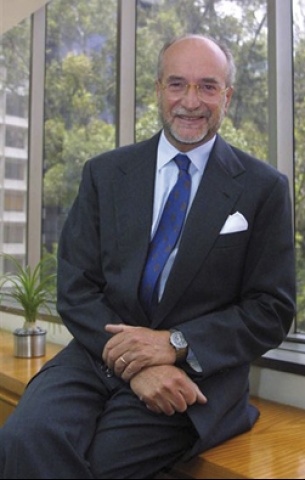
Gianfelice Rocca is an Italian billionaire businessman. He is chairman of the Techint Group and Istituto Clinico Humanitas.

The Bracco Group is an Italian multinational active in the healthcare sector with more than 3,300 employees worldwide, which operates in a variety of business areas.
Rosario Messina,, was an Italian entrepreneur, who in 1978 founded the Italian company Flou, an avant-garde furniture manufacturer.

Trevor Mervyn Jones, CBE PhD DSc (Hon) FRCP FMedSci FBPhS FRSM FRSC FLSW is a visiting professor at King's College London, and a former Head of R&D, at Wellcome. He continues to have a distinguished career in the pharmaceutical and biotech industry as well as in academia.
Paolo Galluzzi is an Italian historian of science.
Marsha Steinberg is a Florentine artist, whose works include drawings, etchings and paintings. She is Coordinator of the Studio Art Program at the California State University Program, Florence and is professor of painting at the Italian International Institute, Lorenzo de' Medici in Florence, Italy.
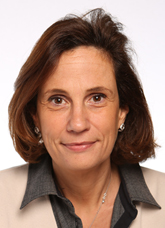
Ilaria Capua is an Italian virologist and former politician, best known for her research on influenza viruses, particularly avian influenza, and her efforts promoting open access to genetic information on emerging viruses as part of pre-pandemic preparedness efforts.
Claudio Zanier is an Italian historian specialising in the history of East Asia and South East Asia, and in the history of silk, in particular.
Alessandro Picardi is an Italian manager.
Romano Volta is an Italian businessman who is the executive chairman and founder of Datalogic, an Italian company manufacturing barcode readers, mobile computers, radio-frequency identification, sensors for detection, and other electronic equipment.

Gianfranco Battisti is an Italian corporate executive. Since 31 July 2018, he has been chief executive officer and general manager of Ferrovie dello Stato Italiane S.p.A.